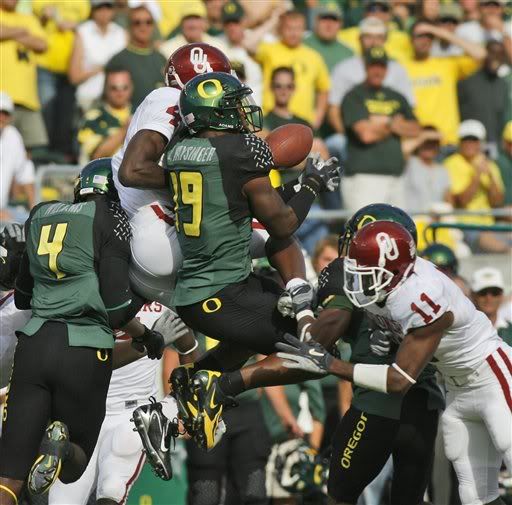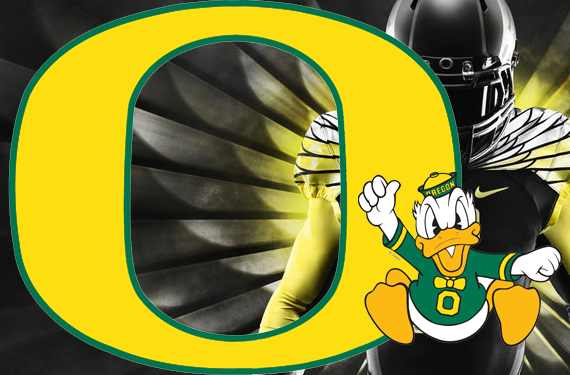http://www.offthepond.net/2009/11/who-t ... week2.html
Great article untangling the Race for the Roses...
Moderators: greenyellow, Autzenoise, UOducksTK1
- MerDuck
- Four Star Recruit
- Posts: 984
- Joined: Sat Jan 10, 2009 11:12 pm
Great article untangling the Race for the Roses...
We all know the drill...win out and it's ours, but what happens if we don't....it doesn't look pretty 

http://www.offthepond.net/2009/11/who-t ... week2.html
http://www.offthepond.net/2009/11/who-t ... week2.html

- wheaton4prez
- Senior
- Posts: 3578
- Joined: Sun Jan 11, 2009 9:36 pm
Re: Great article untangling the Race for the Roses...
Thank you. It's helpful to have someone sort and chart that out.
I must ask, who died and left these people in charge of making up rules for football?
How does it make any sense that a team could, under any circumstances, be penalized more for losing to a better team than to a worse team? USC and Arizona have an advantage over us if they beat Stanford because they lost to Washington? It should be the other way around. Losses to crappy teams should put you behind teams who only lost to good teams (if there is a tie).
I must ask, who died and left these people in charge of making up rules for football?
How does it make any sense that a team could, under any circumstances, be penalized more for losing to a better team than to a worse team? USC and Arizona have an advantage over us if they beat Stanford because they lost to Washington? It should be the other way around. Losses to crappy teams should put you behind teams who only lost to good teams (if there is a tie).
-
duckgrad99
- All Pac-12
- Posts: 6092
- Joined: Sat Jan 10, 2009 10:33 pm
- Location: San Diego
Re: Great article untangling the Race for the Roses...
From what I have figured out, I hope USC wins out and Arizona loses to Cal and or ASU(with a loss to USC of course). That would give Arizona and Stanford at least 3 losses, and Oregon beat USC if it comes down to those two at the end. That would mean that Oregon could probably lose to Arizona, and still make the Rose Bowl with wins over Arizona State and Oregon State. I'm not holding my breath on that though, so let's just win them all!

-
GoDucksIn09
- Senior
- Posts: 3091
- Joined: Sun Jan 11, 2009 11:15 am
Re: Great article untangling the Race for the Roses...
It looked pretty clear to me that iffff Oregon does not win out they will be basically playing in Toilet Bowl. None of the tiebreakers favors Oregon if are in a tie breaker with more than one team. If its USC OSU and us.. we lose.. if its UA USC and us we lose.. if its Stanford USC and us we lose...We can only thank our dear ole Def Coordinator for not having his team focused on wrapping up on tackles.. and defneders not knocking down passes. Many chances to knock down passes and many more oppurtunities against Stanford to wrap Gerhart up and not do the arm tackle crap that Allioti had our defense doing. We have to win out.. plain and simple which is going to be really hard.
- Tray Dub
- All Pac-12
- Posts: 5004
- Joined: Sat Jan 10, 2009 10:31 pm
Re: Great article untangling the Race for the Roses...
The rationale is losses to bad teams = wins against good teams. They're trying to break the ties by head-to-head results as best they can, so the team that has beaten the most of the other tied teams is favored.wheaton4prez wrote:Thank you. It's helpful to have someone sort and chart that out.
I must ask, who died and left these people in charge of making up rules for football?
How does it make any sense that a team could, under any circumstances, be penalized more for losing to a better team than to a worse team? USC and Arizona have an advantage over us if they beat Stanford because they lost to Washington? It should be the other way around. Losses to crappy teams should put you behind teams who only lost to good teams (if there is a tie).
Basically, if you value the strength of wins, the current system makes sense. If you value the "strength" of losses, then the way you're talking about is correct. I understand both arguments.
-
duckgrad99
- All Pac-12
- Posts: 6092
- Joined: Sat Jan 10, 2009 10:33 pm
- Location: San Diego
Re: Great article untangling the Race for the Roses...
GoDucksIn09 wrote:It looked pretty clear to me that iffff Oregon does not win out they will be basically playing in Toilet Bowl. None of the tiebreakers favors Oregon if are in a tie breaker with more than one team. If its USC OSU and us.. we lose.. if its UA USC and us we lose.. if its Stanford USC and us we lose...We can only thank our dear ole Def Coordinator for not having his team focused on wrapping up on tackles.. and defneders not knocking down passes. Many chances to knock down passes and many more oppurtunities against Stanford to wrap Gerhart up and not do the arm tackle crap that Allioti had our defense doing. We have to win out.. plain and simple which is going to be really hard.
We could finish tied with just USC and still go, but I agree, it's asking a lot if the ducks don't win out.

- wheaton4prez
- Senior
- Posts: 3578
- Joined: Sun Jan 11, 2009 9:36 pm
Re: Great article untangling the Race for the Roses...
It doesn't pan out mathematically because moving to the record against "the 4th ranked team" in a three way tie is arbitrary. A team could have narrowly won that game but been blown out by both the 9th and 10th ranked teams.Tray Dub wrote:The rationale is losses to bad teams = wins against good teams. They're trying to break the ties by head-to-head results as best they can, so the team that has beaten the most of the other tied teams is favored.wheaton4prez wrote:Thank you. It's helpful to have someone sort and chart that out.
I must ask, who died and left these people in charge of making up rules for football?
How does it make any sense that a team could, under any circumstances, be penalized more for losing to a better team than to a worse team? USC and Arizona have an advantage over us if they beat Stanford because they lost to Washington? It should be the other way around. Losses to crappy teams should put you behind teams who only lost to good teams (if there is a tie).
Basically, if you value the strength of wins, the current system makes sense. If you value the "strength" of losses, then the way you're talking about is correct. I understand both arguments.
It should go to some cumulative stat. For instance, the cumulative record of the conference teams that they did beat.
- Tray Dub
- All Pac-12
- Posts: 5004
- Joined: Sat Jan 10, 2009 10:31 pm
Re: Great article untangling the Race for the Roses...
That's exactly what they do now. Since everyone plays everyone, if two teams are tied, then the one team that has lost to a bottom-ranked team has beaten all the top-ranked teams. Thus, the cumulative record of the conference teams they did beat is better than a team who has lost to a top-ranked team but has beaten everyone else . I know it's not easy to understand over the internet, but this does make sense.wheaton4prez wrote:It doesn't pan out mathematically because moving to the record against "the 4th ranked team" in a three way tie is arbitrary. A team could have narrowly won that game but been blown out by both the 9th and 10th ranked teams.Tray Dub wrote:The rationale is losses to bad teams = wins against good teams. They're trying to break the ties by head-to-head results as best they can, so the team that has beaten the most of the other tied teams is favored.wheaton4prez wrote:Thank you. It's helpful to have someone sort and chart that out.
I must ask, who died and left these people in charge of making up rules for football?
How does it make any sense that a team could, under any circumstances, be penalized more for losing to a better team than to a worse team? USC and Arizona have an advantage over us if they beat Stanford because they lost to Washington? It should be the other way around. Losses to crappy teams should put you behind teams who only lost to good teams (if there is a tie).
Basically, if you value the strength of wins, the current system makes sense. If you value the "strength" of losses, then the way you're talking about is correct. I understand both arguments.
It should go to some cumulative stat. For instance, the cumulative record of the conference teams that they did beat.
For example, let's say we lose to Arizona and win the other two. That would mean that we have beaten seven conference teams, just like Arizona and USC (SC wins out and Arizona wins out other than SC). But Arizona and USC have only lost to a team tied for first (like us), and a team at the bottom. So Oregon's cumulative win total would be calculated by adding everyone's record up EXCEPT Stanford and Zona, the teams we've lost to. Arizona's win total would be calculated by adding everyone in the conference's record up EXCEPT USC and Washington, and for SC it would be the same, just replace Oregon with SC. Since Zona and SC are not adding in Washington to their cumulative win totals whereas we are, BUT we're not adding Stanford to our cumulative win totals like they are, their cumulative win totals (or cumulative record, it's the same thing) would be higher, since they beat the best teams.
Hope that makes sense.
- MerDuck
- Four Star Recruit
- Posts: 984
- Joined: Sat Jan 10, 2009 11:12 pm
Re: Great article untangling the Race for the Roses...
Tray Dub wrote: That's exactly what they do now. Since everyone plays everyone, if two teams are tied, then the one team that has lost to a bottom-ranked team has beaten all the top-ranked teams. Thus, the cumulative record of the conference teams they did beat is better than a team who has lost to a top-ranked team but has beaten everyone else . I know it's not easy to understand over the internet, but this does make sense.
For example, let's say we lose to Arizona and win the other two. That would mean that we have beaten seven conference teams, just like Arizona and USC (SC wins out and Arizona wins out other than SC). But Arizona and USC have only lost to a team tied for first (like us), and a team at the bottom. So Oregon's cumulative win total would be calculated by adding everyone's record up EXCEPT Stanford and Zona, the teams we've lost to. Arizona's win total would be calculated by adding everyone in the conference's record up EXCEPT USC and Washington, and for SC it would be the same, just replace Oregon with SC. Since Zona and SC are not adding in Washington to their cumulative win totals whereas we are, BUT we're not adding Stanford to our cumulative win totals like they are, their cumulative win totals (or cumulative record, it's the same thing) would be higher, since they beat the best teams.
Hope that makes sense.
Tray, I think you missing the original argument here...or maybe I am off in la la land...who knows but here is my shot...
I like and agree with everything in your post...it is a complete analysis of what will actually happen if we end up in that three-way-tie. But the original argument/complaint here was that basically because (other than the losses that Oregon, USC, and Arizona would have against each other in that scenario) we lost to Stanford, no doubt a better team than the Washington team that USC AND Arizona lost to, we will get penalized.....where as if you started the tie-breaker process from the bottom of the PAC...
like say who beat WSU, then Who beat UCLA, and then who beat Washington (assuming it is in that order...) then we would win the tie-breaker, because we didn't lose our second game to a crappy team ranked 7th in the Pac but to a team that is just outside the tie for first....Stanford which would theoretically be ranked 4th....our losses would be to the 4th ranked team and the 1st ranked team, where as their losses would be to the 7th and 1st...
does that make sense?

-
woundedknees
- All-American
- Posts: 12855
- Joined: Sat Jan 10, 2009 11:06 pm
Re: Great article untangling the Race for the Roses...
Of course it makes sense... That's why the formula will never be employed!
Autzen Stadium... Where great teams go to die...Hard!


- Tray Dub
- All Pac-12
- Posts: 5004
- Joined: Sat Jan 10, 2009 10:31 pm
Re: Great article untangling the Race for the Roses...
I was worried this might happen. I actually am defending the way it currently works now, not just explaining. Put simply, the formula right now favors teams with better wins rather than better losses. Arizona and USC have won more good games than we have (in terms of which Pac-10 teams they've beaten).MerDuck wrote:Tray Dub wrote: That's exactly what they do now. Since everyone plays everyone, if two teams are tied, then the one team that has lost to a bottom-ranked team has beaten all the top-ranked teams. Thus, the cumulative record of the conference teams they did beat is better than a team who has lost to a top-ranked team but has beaten everyone else . I know it's not easy to understand over the internet, but this does make sense.
For example, let's say we lose to Arizona and win the other two. That would mean that we have beaten seven conference teams, just like Arizona and USC (SC wins out and Arizona wins out other than SC). But Arizona and USC have only lost to a team tied for first (like us), and a team at the bottom. So Oregon's cumulative win total would be calculated by adding everyone's record up EXCEPT Stanford and Zona, the teams we've lost to. Arizona's win total would be calculated by adding everyone in the conference's record up EXCEPT USC and Washington, and for SC it would be the same, just replace Oregon with SC. Since Zona and SC are not adding in Washington to their cumulative win totals whereas we are, BUT we're not adding Stanford to our cumulative win totals like they are, their cumulative win totals (or cumulative record, it's the same thing) would be higher, since they beat the best teams.
Hope that makes sense.
Tray, I think you missing the original argument here...or maybe I am off in la la land...who knows but here is my shot...
I like and agree with everything in your post...it is a complete analysis of what will actually happen if we end up in that three-way-tie. But the original argument/complaint here was that basically because (other than the losses that Oregon, USC, and Arizona would have against each other in that scenario) we lost to Stanford, no doubt a better team than the Washington team that USC AND Arizona lost to, we will get penalized.....where as if you started the tie-breaker process from the bottom of the PAC...
like say who beat WSU, then Who beat UCLA, and then who beat Washington (assuming it is in that order...) then we would win the tie-breaker, because we didn't lose our second game to a crappy team ranked 7th in the Pac but to a team that is just outside the tie for first....Stanford which would theoretically be ranked 4th....our losses would be to the 4th ranked team and the 1st ranked team, where as their losses would be to the 7th and 1st...
does that make sense?
Haha that might have been a better explanation than my multi-paragraph one.
- gregspechtismyhero
- Freshman
- Posts: 1475
- Joined: Sat Jan 10, 2009 11:16 pm
- Location: Lake Oswego, OR
Re: Great article untangling the Race for the Roses...
How about we do the conference a huge favor and win out. I wouldn't mind taking that burden from the commish's shoulder's
In Helfrich, Frost, and Allioti we trust
 (USA Today Sports)
(USA Today Sports)
AIM: hockeygoalie923
 (USA Today Sports)
(USA Today Sports)AIM: hockeygoalie923
- MerDuck
- Four Star Recruit
- Posts: 984
- Joined: Sat Jan 10, 2009 11:12 pm
Re: Great article untangling the Race for the Roses...
Tray Dub wrote: I was worried this might happen. I actually am defending the way it currently works now, not just explaining. Put simply, the formula right now favors teams with better wins rather than better losses. Arizona and USC have won more good games than we have (in terms of which Pac-10 teams they've beaten).
Haha that might have been a better explanation than my multi-paragraph one.
I figured that out about a 6 and a half hours after I posted...I was sitting in my LSAT class and I was like "oh I see what he is saying!"
I guess I can see how both arguments make sense, I think it would make more sense to look at the overall win loss column as apposed to just going down the conference games until we find a tie breaker...
I think the way it is now is a throw back to when the bowls were solely based on conference play and there was effectively a pre-season/exhibition season that didn't count...
Now every game counts...so why not use them...I know I will get the arguments about playing a weak OOC schedule, but there are other ways around that...like only allowing one FCS school a year or something....
I guess this just needs to get added to the list of illogical things about NCAAF that drive us nutz, but will probably never change in our lifetime!
I agree with Greg...JUST WIN OUT!

- wheaton4prez
- Senior
- Posts: 3578
- Joined: Sun Jan 11, 2009 9:36 pm
Re: Great article untangling the Race for the Roses...
Thank you. I know what you are referring to. I should have worded my statement differently. The cumulative stat should account for both wins and losses. Not just either wins or losses. There is no reason for it to count only one or the other. A win should credit you the wins that team has while a loss should subtract that teams number of losses. That way, beating a 7-2 team and losing to a 2-7 team would be a wash. Losing to a good team wouldn't hurt you as much as to a bad one and beating a bad team doesn't help you as much as beating a good one.Tray Dub wrote:That's exactly what they do now. Since everyone plays everyone, if two teams are tied, then the one team that has lost to a bottom-ranked team has beaten all the top-ranked teams. Thus, the cumulative record of the conference teams they did beat is better than a team who has lost to a top-ranked team but has beaten everyone else . I know it's not easy to understand over the internet, but this does make sense.
For example, let's say we lose to Arizona and win the other two. That would mean that we have beaten seven conference teams, just like Arizona and USC (SC wins out and Arizona wins out other than SC). But Arizona and USC have only lost to a team tied for first (like us), and a team at the bottom. So Oregon's cumulative win total would be calculated by adding everyone's record up EXCEPT Stanford and Zona, the teams we've lost to. Arizona's win total would be calculated by adding everyone in the conference's record up EXCEPT USC and Washington, and for SC it would be the same, just replace Oregon with SC. Since Zona and SC are not adding in Washington to their cumulative win totals whereas we are, BUT we're not adding Stanford to our cumulative win totals like they are, their cumulative win totals (or cumulative record, it's the same thing) would be higher, since they beat the best teams.
Hope that makes sense.
As I mentioned, the way that it works now does not pan out mathematically. It arbitrarily accounts for some games and completely disregards others when all of them are significant toward how well that team has played conference teams. If a team loses to the two worst teams in the conference, there should be no way for them to make the Rose Bowl because they beat the fourth best team (assuming a tie situation).
- Tray Dub
- All Pac-12
- Posts: 5004
- Joined: Sat Jan 10, 2009 10:31 pm
Re: Great article untangling the Race for the Roses...
I like the idea. But mathematically, in the event of a three-way tie in a conference that has round-robin scheduling, you can't look at cumulative. If we use cumulative win/loss record, then it will come out tied, since we play the same teams. I know it's arbitrary, but you HAVE to either favor wins or losses (or move on to some other tie-breaker completely). You can't include them both.
So if you one team loses to a 7-2 team and beats a 2-7 team, and one loses to a 2-7 team and beats a 7-2 team... Both of those two tied teams' opponents' cumulative win/loss record would be 9-9.
Merduck, are you talking about looking at overall record of the tied teams (so looking at non-conference games too)? Or are you saying what w4p is saying?
So if you one team loses to a 7-2 team and beats a 2-7 team, and one loses to a 2-7 team and beats a 7-2 team... Both of those two tied teams' opponents' cumulative win/loss record would be 9-9.
Merduck, are you talking about looking at overall record of the tied teams (so looking at non-conference games too)? Or are you saying what w4p is saying?
